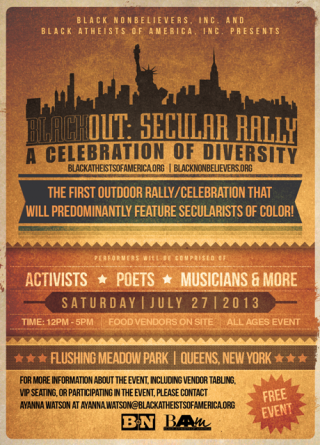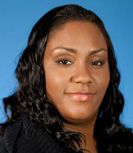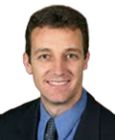Religion
Blackout Secular Rally: Atheism Makes Minority Inroads
Once invisible, African-American nonbelievers organize NYC rally
Posted July 17, 2013

In yet another sign of how the American secular demographic is emerging – in terms of both raw numbers and organizational commitment – the first-ever rally featuring nonbelievers of color is scheduled for later this month in New York. The Blackout Secular Rally takes place on the afternoon of Saturday, July 27, at Flushing Meadow Park in Queens.
The event was inspired by last year’s Reason Rally in Washington, says Mandisa Thomas, president of Black Nonbelievers, a co-sponsor of the celebration along with Black Atheists of America. The Reason Rally drew over 20,000 nonbelievers from all over the country to the National Mall on a rainy March day, showing a solidarity that had never before been demonstrated by America’s atheists and humanists.
“We thought it would be a great idea to have a similar event," Thomas told me in a recent interview, adding that the Blackout will be a chance to showcase both the growing numbers of secular minorities as well as pro-secular speakers and performers who may not be well known outside the African-American community.
The notion of “coming out” as atheist, agnostic, or humanist has been an important part of the modern secular movement, and it is getting traction in minority communities as well, Thomas says: “There are now more atheists of color making themselves more visible.”
The Blackout is also an opportunity for seculars of color to network and find support, she said, which is especially important for minorities who are faced with heavily religious communities. The idea, she explained, is to "help people understand there is nothing wrong with questioning religion, being open about atheism."

Mandisa Thomas
Like everyone else, minorities are increasingly aware of knowledge and scientific advances that raise questions about religious truth claims and validate skepticism, Thomas said, and other factors, such as religious scandals, have also caused many to question traditional faith. As such, her group wants those doubters to know they aren’t alone. “It is important for us to be more visible in order to create better communication and help our communities,” she said.
It shouldn’t be surprising that atheism and humanism are becoming more prominent in the African-American community. In his candid memoir Dreams from My Father, Barack Obama made it clear that he was raised by a secular humanist mother, and by all indications was himself a nonbeliever well into adulthood. Christianity may have helped shape his political career, but humanism shaped his character and his values.
And religious skepticism isn’t new to the African-American tradition. Though often overlooked by commentators, the role of black nonbelievers has been significant. A. Philip Randolph, who was the American Humanist Association’s Humanist of the Year in 1970, was a powerful union leader and civil rights activist. Randolph successfully convinced Franklin Roosevelt to issue an executive order banning racial discrimination in defense industries during the Second World War, and was instrumental in getting Harry Truman to desegregate the military in 1948. He was also a key organizer of the 1963 March on Washington, where Martin Luther King, Jr., gave his famous “I Have a Dream” speech before an audience of over 200,000. King called Randolph "the Chief."
W.E.B. Du Bois, probably the most widely known black leader and intellectual of the twentieth century before King, was also a skeptic. Even Frederick Douglass, though not an open atheist, had harsh words for organized religion. "I can see no reason, but the most decietful one, for calling the religion of this land Christianity. I look upon it as the climax of all misnomers, the boldest of all frauds, the grossest of all libels."
Thus, in some ways the Blackout can be seen as a revival or sorts - a revival of a proud African-American tradition of skepticism and humanistic values. As the event will no doubt help show, an appreciation of reason and critical thinking are not unique to any one race, sex, or socio-economic class.
David Niose's book, Nonbeliever Nation: The Rise of Secular Americans is available here.
Follow David Niose on Twitter




